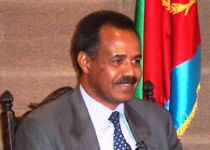Afewerki – Demarcation is main mission of UN in Eritrea-Ethiopia row
Mar 31, 2006 (MASSAWA) — In a meeting held with the special representative of the UN secretary-general in Eritrea and Ethiopia, Legwaila Joseph Legwaila, the Eritrean president said border demarcation remains the principal assignment of the UN Mission in Eritrea and Ethiopia (UNMEE).
 President Isayas Afewerki underlined that the main issue today, as in the past, remains border demarcation, and as such this should be the centre of focus. He further pointed out that in accordance with the Algiers Agreement between Eritrea and Ethiopia, border demarcation is the sole mandate of the Eritrea-Ethiopia Boundary Commission (EEBC).
President Isayas Afewerki underlined that the main issue today, as in the past, remains border demarcation, and as such this should be the centre of focus. He further pointed out that in accordance with the Algiers Agreement between Eritrea and Ethiopia, border demarcation is the sole mandate of the Eritrea-Ethiopia Boundary Commission (EEBC).
Eritrea gained independence from Ethiopia in 1993 after a 30-year guerrilla war, but their 1,000-kilometer (621-mile) border was never officially demarcated. The border war erupted five years after independence.
For Eritrea, the land dispute is a matter of national pride and the ultimate assertion of independence. Many Ethiopians still do not accept Eritrea’s independence, and pride also plays a part in Ethiopia’s refusal to settle the dispute.
An international border commission set up under a 2000 peace deal. Both countries agreed in advance to accept the commission’s ruling, but when the ruling came in 2002, Ethiopia rejected it because the key town of Badme and other territories – competing claims make it difficult to determine how much land is at stake – were awarded to Eritrea. Ethiopia had gained territory in the ruling, and official previously said the country had won more land than it lost.
Isayas assured Legwaila that in the event demarcation takes place on the basis of the EEBC’s final and binding decision, it would not be difficult to find answers to issues that may be raised as regards UNMEE’s role, reported the Eritrean Ministry of Information’s Shabait website.
Late last year, Eritrea, intent on getting the international community to press Ethiopia to accept the border ruling, banned helicopter flights by U.N. peacekeepers in its airspace, restricted U.N. ground patrols and expelled some of the workers. At around the same time, the U.N. reported Eritrean and Ethiopian troop buildups, primarily by Ethiopia, along the border.
On current talks about facilitator to speed up border demarcation, the president indicated that the government of Eritrea has no interest to talk about individuals but border demarcation. He went to underscore that any individual’s role cannot contravene the Algiers Agreement, the EEBC’s binding decision and its directives connected with its implementation, the Shabait said.
Legal experts from Ethiopia and Eritrea began talks with international mediators on 10 March in London on demarcating the border between the two Horn of Africa countries.
Expressing his regret for no outcome in the extended five-and-a-half year tour of duty in Eritrea that was originally set at 16 months, Legwaila voiced concern over the international community’s failure to take any concrete action on the Eritrea-Ethiopia issue.
Joseph Legwaila is concluding his tour of duty in Eritrea.
Eritrea has repeatedly expressed frustration that the international community has not done enough to make Ethiopia comply with the ruling.
In January, U.N. Secretary-General Kofi Annan said Eritrea’s restrictions on U.N. peacekeepers had made their mission increasingly untenable.
The current U.N. Mission in Ethiopia and Eritrea mandate is due to expire on March 15.
The mandate is usually renewed for six months at a time but Annan recommended the mandate be renewed for two to three months while the United States tried to find a solution.
(ST)
